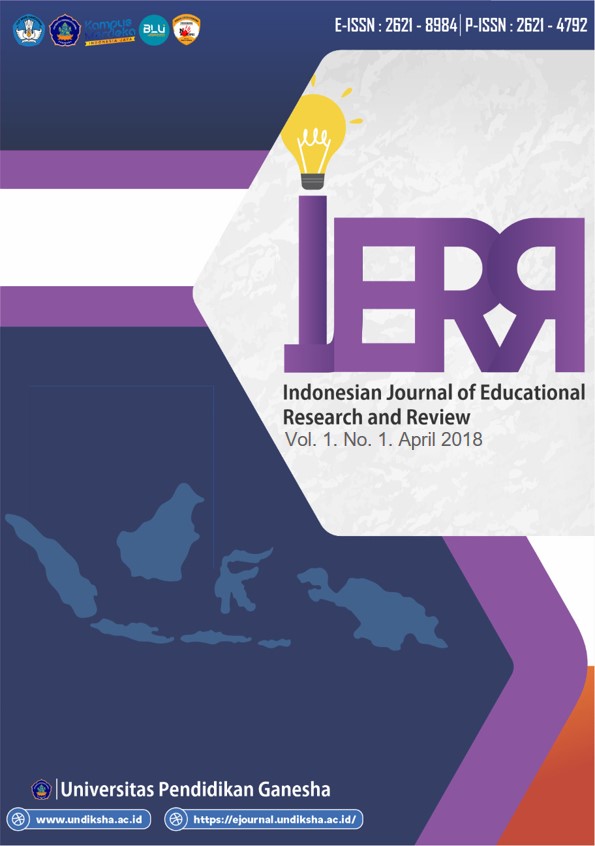PENGARUH MODEL PEMBELAJARAN AUDITORY, INTELLECTUALY, REPETITION BERBANTUAN MEDIA AUDIO VISUAL TERHADAP KOMPETENSI PENGETAHUAN IPA
DOI:
https://doi.org/10.23887/ijerr.v1i1.14625Abstract
This research was aimed at determining the significant differences regarding knowledge competence of science between groups of students applying auditory, intellectualy, repetition learning model using audio visual media with group of students who applied conventional learning in grade IV of SD Gugus Kompyang Sujana in North Denpasar, academic year 2017/2018. The type of research used was quasi experiment by using non-equivalent group design. The population of this study were 346 students covering all the fourth graders of SD Gugus Kompyang Sujana in North Denpasar, academic year 2017/2018. Sampling was done by group sample technique, which was held by doing random in class group, so that the following results were obtained; IVA grade of SD Negeri 4 Tonja as experiment class and IV grade of SD Negeri 4 Peguyangan as control class. The result of calculation of "gain" data score showed the average value of science knowledge competence of experimental class students was higher than the average knowledge competence of science students of control class (experiment = 0,63 > control = 0,50). Hypothesis testing was analyzed using the t-test with the formula "polled variance". Testing criteria at significance level of 5% and dk = 80. Provided tcount value = 4,157 > ttable value = 2,000 This means that there were significant differences regarding knowledge competence of science in groups of students applying auditory, intellectualy, repetition learning model using audio visual media with group of students who applied conventional learning in grade IV of SD Gugus Kompyang Sujana in North Denpasar, academic year 2017/2018. Thus, auditory, intellectualy, repetition learning model using audio visual media have an effect on science knowledge competence of fourth grader students of SD Gugus Kompyang Sujana in North Denpasar in academic year 2017/2018.
References
Agung, A. A. G. 2011. Pengantar Evaluasi Pendidikan. Singaraja: Jurusan Teknologi Pendidikan, Fakultas Ilmu Pendidikan Universitas Pendidikan Ganesha.
Agung, A. A. G. 2014. Buku Ajar Metodologi Penelitian Pendidikan. Yogyakarta:
Aditya Media Publishing.
Arikunto, Suharsimi. 2015. Dasar-Dasar Evaluasi Pendidikan. Jakarta: PT. Bumi Aksara.
Kurniasih, Imas dan Berlin Sani. 2014. Sukses Mengimplementasikan Kurikulum 2013 Memahami Berbagai Aspek Dalam Kurikulum 2013. Yogyakarta: Kata Pena.
Mahardika, I.G. Putu Putra. (2017). “Pengaruh Model Pembelajaran ‘TANDUR’ Berbantuan Media Audio Visual terhadap Kompetensi Pengetahuan IPA Siswa Kelas V”. Jurusan PGSD Universitas Pendidikan Ganesha Singaraja, Indonesia, Volume 5, Nomor 2 (hlm.1-9). Tersedia pada https://ejournal.undiksha.ac.id/index.php/JJPGSD/article/view/10909 (diakses tanggal 11 Januari 2018).
Samatowa, Usman. 2016. Pembelajaran IPA di Sekolah Dasar. Jakarta: PT. Indeks.
Setyosari, Punaji. 2015. Metode Penelitian Pendidikan dan Pengembangan. Jakarta: Prenadamedia group.
Shoimin, Aris. 2014. 68 Model Pembelajaran Inovatif dalam Kurikulum 2013.
Yogyakarta: Ar-ruzz Media.
Susanto, Ahmad. 2013. Teori Belajar dan pembelajaran di Sekolah Dasar. Jakarta:
Undang-Undang Republik Indonesia Nomor 20 Tahun 2003 tentang Sistem Pendidikan Nasional. 2003. Jakarta: Pemerintah Republik Indonesia. Prenadamedia Group.
Wati, Ega Rima. 2016. Ragam Media Pembelajaran Visual-Audio Visual- Komputer-Power Point- Internet-Interactive Video. Yogyakarta: Kata Pena
Widiastuti, A.A.Pt Yuni. (2014). “Pengaruh Model Auditory Intellectualy Repetition Berbantuan terhadap Keterampilan Berbicara”. Jurusan Pendidikan Guru Sekolah Dasar FIP Universitas Pendidikan Ganesha Singaraja Indonesia, Volume 2, Nomor 1 (hlm.---). Tersedia pada https:// ejournal.undiksha.ac.id/index.php/JJPGSD/article/view/2223 (diakses tanggal 11 Nopember 2017)
Wisudawati, Asih Widi dan Eka Sulistyowati. 2014. Metodologi Pembelajaran IPA. Jakarta: PT. Bumi Aksara.
Yusuf, Muri. A. 2015.Asesmen dan Evaluasi Pendidikan Pilar Penyedia Informasi dan Kegiatan pengendalian Mutu Pendidikan. Jakarta: Prenadamedia Group.
Downloads
Published
How to Cite
Issue
Section
License
Authors who publish with the Indonesian Journal of Educational Research and Review (IJERR) agree to the following terms:
- Authors retain copyright and grant the journal the right of first publication with the work simultaneously licensed under a Creative Commons Attribution-ShareAlike 4.0 International License. that allows others to share the work with an acknowledgment of the work's authorship and initial publication in this journal.
- Authors are able to enter into separate, additional contractual arrangements for the non-exclusive distribution of the journal's published version of the work (e.g., post it to an institutional repository or publish it in a book), with an acknowledgment of its initial publication in this journal.
- Authors are permitted and encouraged to post their work online (e.g., in institutional repositories or on their website) prior to and during the submission process, as it can lead to productive exchanges, as well as earlier and greater citation of published work. (See The Effect of Open Access)









